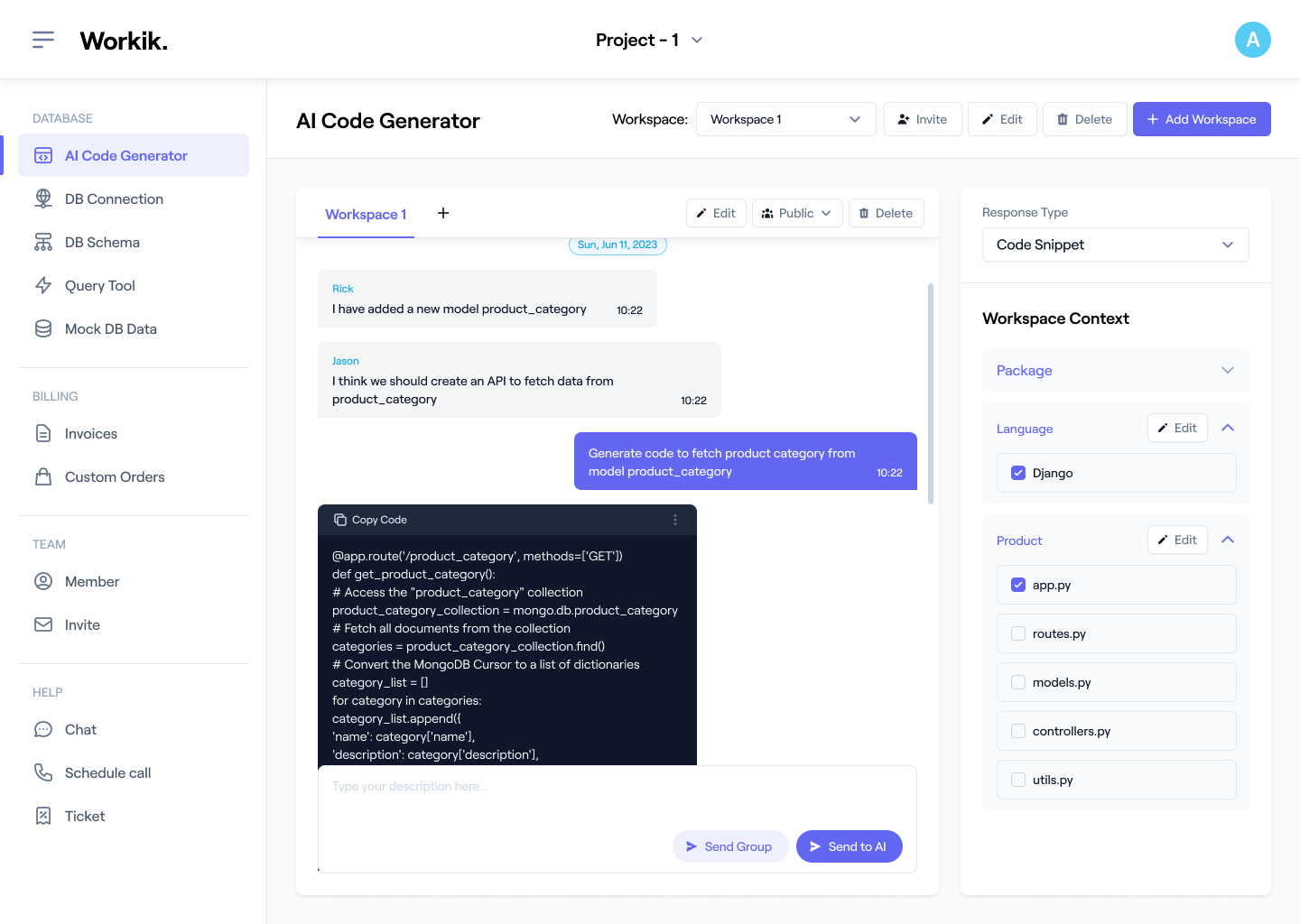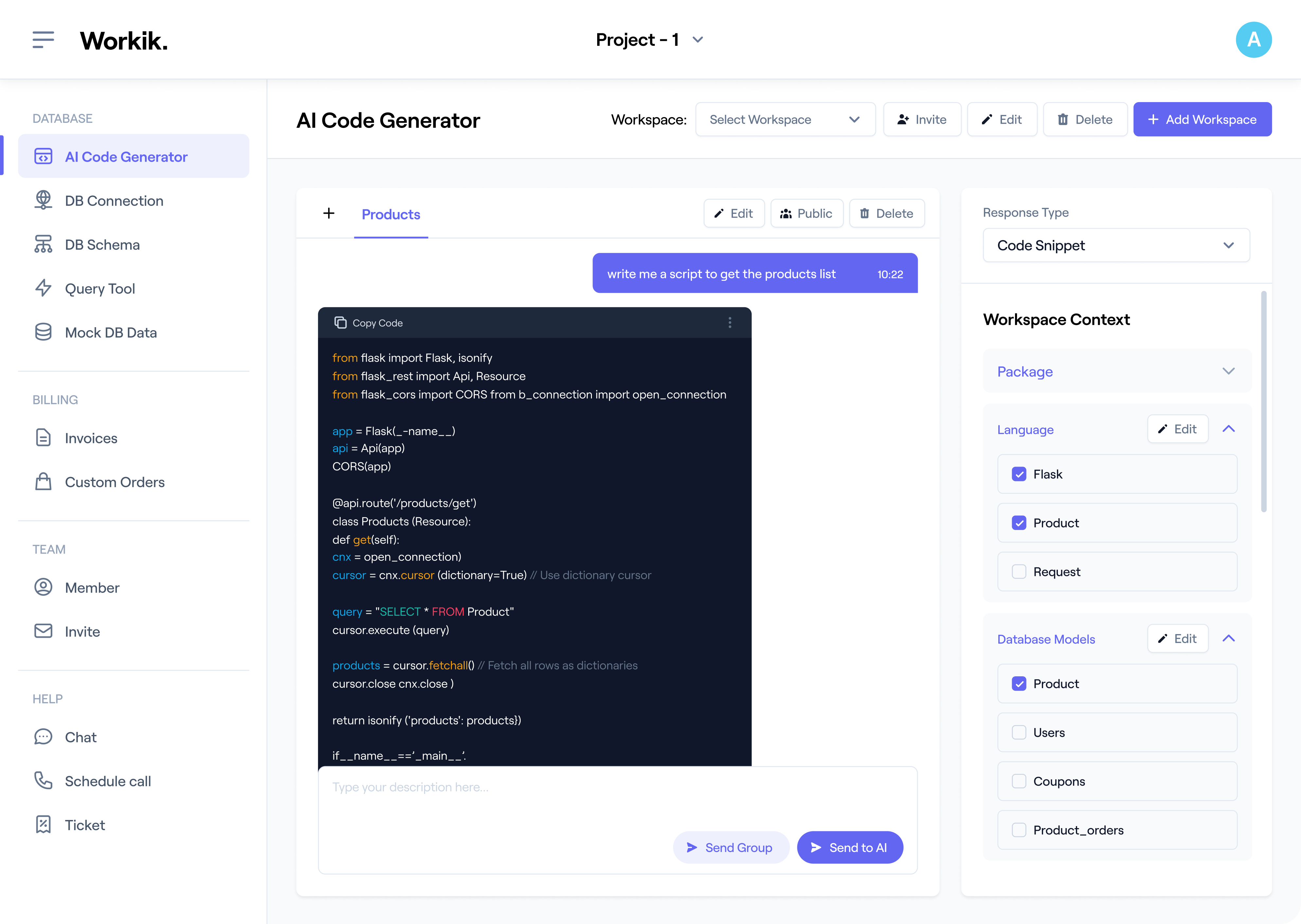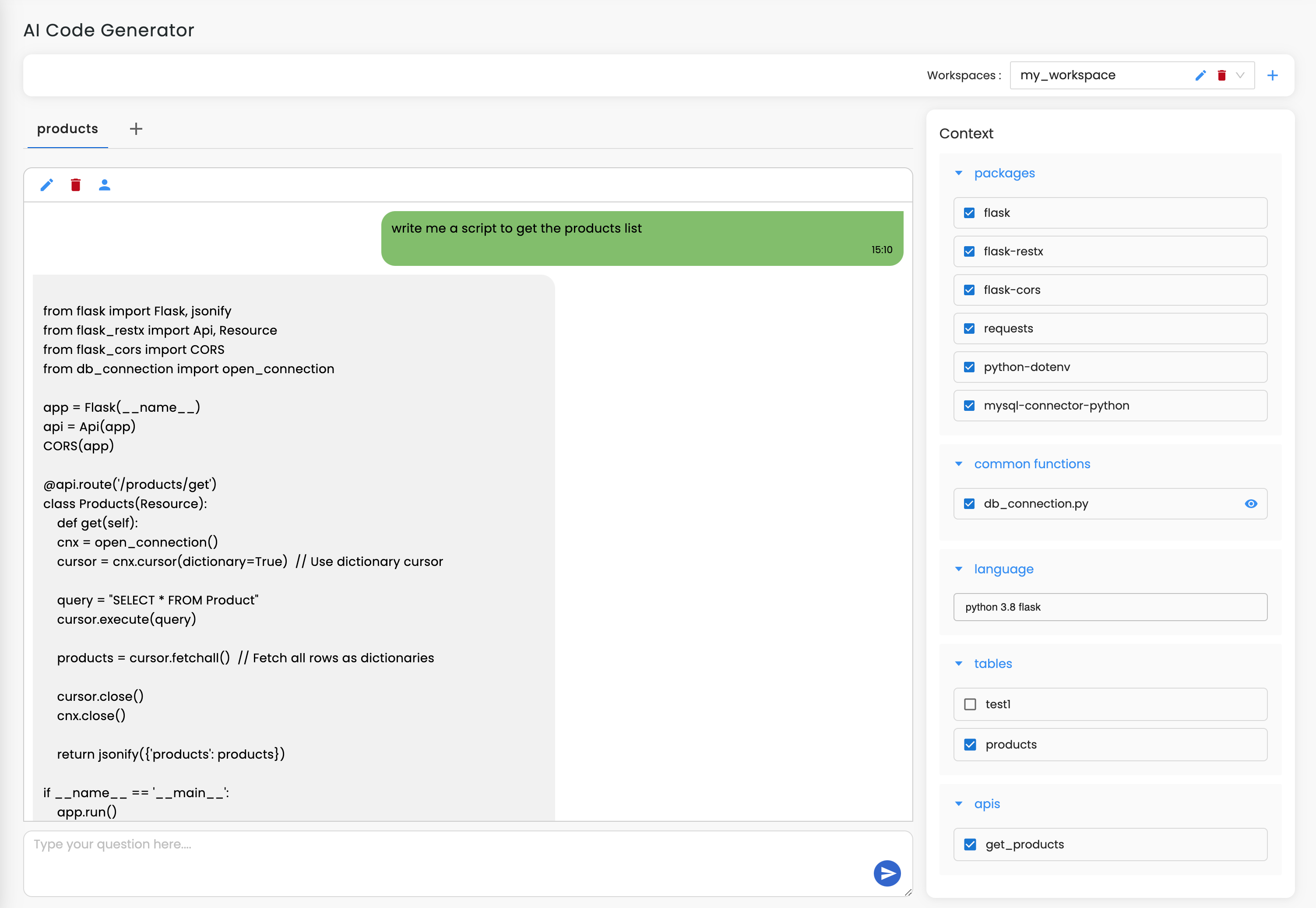
Join our community to see how developers are using Workik AI everyday.
Features

Generate Meta Tags
AI analyzes page content to craft precise title and description tags for seamless integration into SEO workflows.

Enhance Content Readability
Leverage AI to optimize content readability with insights based on Flesch-Kincaid scoring and concise writing principles.

Optimize Internal Links
AI identifies linking gaps and suggests strategies to improve site hierarchy and user navigation.

Suggest Schema Markup
AI generates structured data using Schema.org to boost search visibility with rich snippets.
How it works
Register effortlessly to access AI-powered tools for SEO analysis, metadata generation, and content structure optimization tailored to your site.
Provide your website’s structure via sitemaps or uploaded context. Specify parameters like target keywords, readability preferences, and competitive analysis points for focused AI insights.
Use AI to identify content gaps, suggest keyword placements, generate schema markups, and craft optimized metadata for enhanced SERP performance.
Share AI-generated insights with your team, refine suggested changes, and apply updates manually or via provided workflows for ongoing SEO improvement.


Expand
.png)
.png)
Expand


Expand


Expand


Expand


Expand


Expand


TESTIMONIALS
Real Stories, Real Results with Workik
AI-powered on-page SEO streamlined my workflow with precise meta tags and schema insights. It’s a must-have!

Fin Chen
Senior SEO Engineer
Workik AI saves hours by analyzing content gaps and refining keyword strategies, making optimization effortless.

Anthony Daniel
Web Developer
Readability and linking suggestions from AI have boosted both user engagement and SEO rankings.

Amanda Brooks
Content Strategist
What are the popular use cases of Workik's AI-Powered On-Page SEO Generator?


Popular use cases for Workik AI in on-page SEO include but are not limited to:
* Generate SEO-friendly meta tags and schema markups tailored to content intent.
* Analyze and optimize keyword density, placement, and relevance across pages.
* Automate internal linking suggestions to improve site hierarchy and user navigation.
* Conduct competitor benchmarking for actionable SEO insights.
* Identify content gaps and recommend improvements to boost search rankings.
* Optimize mobile-friendliness and page speed with AI-driven recommendations.
* Create structured data for advanced SERP features like rich snippets and knowledge graphs.
Can Workik AI suggest keyword placement for better semantic search optimization?


Yes. For instance, if your page targets "sustainable fashion," the AI recommends secondary keywords like "eco-friendly clothing" or "green apparel" and shows where they best fit in headings or paragraphs.
Does the Workik AI improve accessibility for SEO?


Absolutely. Workik AI evaluates your content for WCAG compliance, suggesting fixes like adding ARIA labels or ensuring contrast ratios meet accessibility standards. This not only improves SEO but also broadens your audience reach by enhancing usability for all visitors.
Can Workik AI help improve CTR (Click-Through Rate) beyond meta optimization?


Yes, Workik AI analyzes user engagement metrics like bounce rate and time on page to recommend improvements. For example, it suggests adding FAQs or testimonials to make pages more engaging, or optimizing headings for better visual appeal.
Generate Code For Free

On-Page SEO: Question and Answer
On-page SEO refers to the practice of optimizing individual web pages to improve their rankings in search engine results and attract organic traffic. It involves optimizing content, metadata, internal links, and HTML elements like title tags, headers, and alt text. On-page SEO ensures that your website is user-friendly, mobile-optimized, and aligned with search intent.
Popular tools:
Analysis: Google Search Console, SEMrush, Ahrefs
Optimization: Yoast SEO, Rank Math, Surfer SEO
Monitoring: Screaming Frog, Sitebulb, PageSpeed Insights
Collaboration: HubSpot SEO, ContentKing
Languages & frameworks:
HTML5 & CSS3
React, Angular
Python, JavaScript
On-page SEO is widely used for:
E-commerce:
Optimizing product descriptions, URLs, and metadata to improve search visibility and conversions.
Blogging:
Enhancing keyword density, internal linking, and readability for audience retention.
Local SEO:
Embedding structured data to rank higher for local queries.
Real-time Analytics:
Refining content based on visitor behavior using AI-driven insights.
Content Revamp:
Refreshing older pages with updated keywords, media, and metadata to boost rankings.
Roles include SEO Specialist, Content Strategist, Digital Marketing Manager, SEO Analyst, and Web Developer (with a focus on SEO integration). Technical roles may involve automating SEO audits or building AI-driven SEO tools.
Workik AI assists by:
Metadata Optimization:
Generates keyword-rich title tags and meta descriptions to improve click-through rates.
Content Analysis:
Identifies gaps in keyword usage and recommends updates based on semantic analysis.
Internal Linking:
Suggests opportunities to improve page authority and reduce bounce rates.
Schema Implementation:
Creates structured data for articles, products, and local businesses.
Performance Insights:
Analyzes page speed, mobile usability, and Core Web Vitals for technical optimization.
Real-Time Audits:
Provides actionable insights for ongoing SEO improvements using visitor data.
Keyword Strategy:
Recommends long-tail and LSI keywords tailored to your audience's search intent.
Accessibility Checks:
Flags non-compliance issues like missing alt text and contrast ratios for WCAG standards.
Explore more on Workik
Get in touch
Don't miss any updates of our product.
© Workik Inc. 2026 All rights reserved.

